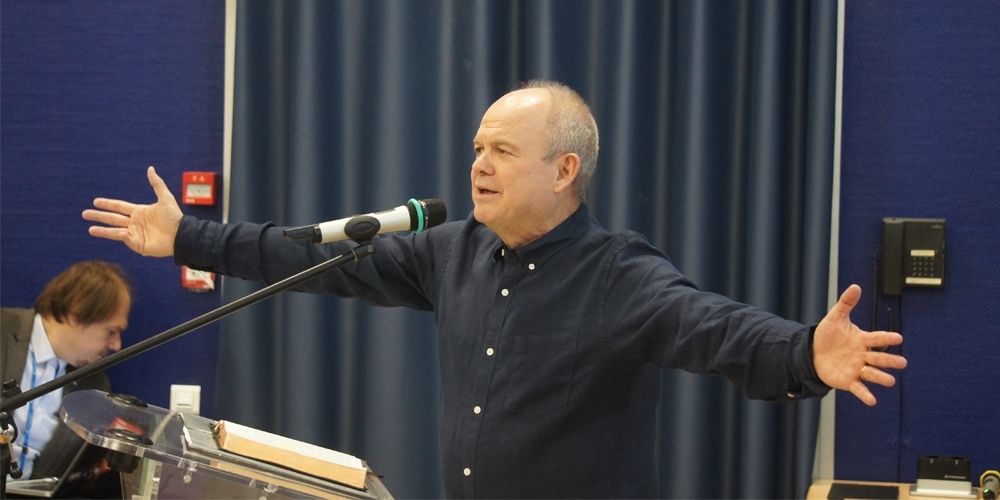
Europe is a secular, postmodern continent, almost religion-proof, or at least it may seem that way from the outside. The evidence is that many Christian denominations are struggling to keep church attendees.
This scenario has brought the Executive Committee of the Inter-European Division church region of the Seventh-day Adventist Church (EUD) to think deeply about the denomination’s growth during its annual meeting, held this year at Lyon, France.
EUD invited special guests to provide the attendees with advice and tips on the topic. Keynote speakers were Wayne Krause from the South Pacific Division region — where he is the director of church planting, discipleship, and Mission to the Cities programs — and Jon Paulien, former dean of the School of Religion at Loma Linda University, in California, United States.
Challenges to Mission
Challenges on the old continent are not new, according to the speakers; they just correspond to a transition of social paradigms. The main issue for the Adventist Church, they said, is to catch up with the quickly changing society.
“Who do you feel better sharing the gospel with — Christians from other denominations or secular people who are not interested in God?” Krause asked the audience. He used, as an example, what happened to the apostle Peter when God asked him to visit the Roman centurion Cornelius. The disciples had to break down the mental barrier that existed between those of the circumcision and those who were “pagans” (see Acts 10 in the Bible).
Since society is no longer quite as interested in churches, religion, or the Bible, there is a decrease in the audience ready to listen to Adventism’s traditional ways of sharing; and the same is the case for baptisms and conversions.
“There’s a big difference between teaching a distinctive doctrine to someone who is already a believer and preaching the gospel to a [total] non-believer, to secular people,” Krause said. “Today, in secular countries, asking someone to study the Bible is not relevant for them any more than asking him or her to study the Quran.”
The Key Is Making Disciples
Nowadays, the point is to make disciples of people rather than just teach or share knowledge. This action, called discipleship, implies not only the delivery of a message but also the decision to stay, share time, and live with people — as Jesus did.
Krause asked for support for those who are making disciples among secular people, since for a “traditional Adventist,” this does not look like giving regular Bible studies. “Don't criticize those who are making new disciples out of secular people,” he added. “It is just a different way of preaching the gospel.”
“One way to know how your local church is doing is to ask yourselves, ‘If my church closes today, will the community and neighborhood notice it? Will they miss the church?’” Paulien suggested. According to his approach, the key point is to serve the local community not only on Saturday (Sabbath) but all the time. Otherwise, the church risks becoming a social and select club.
“We need to learn the difference between felt needs and gospel needs,” Paulien explained. “Everybody needs the gospel, but [secular postmodern] people don’t feel they need it, so we need to find out what the people feel they need.”
Krause presented one very inspiring idea: “We exist for those not here yet.” By understanding the reason for the church’s existence, believers will, at the same time, find the leading motivation to act and change the way of living out the gospel.
God Is Still Present
The question was raised, “Can we find God in a postmodern society?”
“Yes, of course!” Paulien said. “God continues to work in any society.” According to him, the best adapted way of sharing the good news in this context is being humble, authentic, and honest about failures; it's about providing a model of identity and helping others to have a meaningful life.
“Postmodern people need a community where [they can] belong, but it has to be inclusive, willing to listen, [with people who are] being spiritually tolerant as well [with the opposite-minded],” Paulien said. “The church needs to tell the truth as a story,” he insisted.
Paulien emphasized that if the church wants to succeed, it must take specific actions. It needs to move forward with society, and we, as members, need to adapt ourselves to society’s way of communicating the eternal truths.
“It must be done in such a way that postmodern people receive the truths through the vehicle they are looking for and using in their daily life,” he said.
The original version of this story was posted on the Inter-European Division news site.